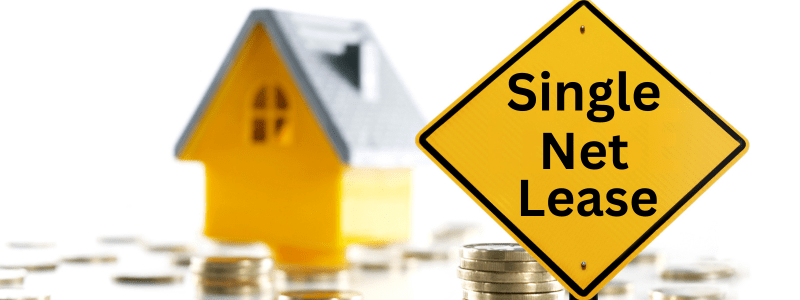
Navigating the world of commercial real estate can feel like wandering through a maze, especially when lease types come into play. One term you might stumble upon is the Single Net Lease. But what exactly is it? And why should you care? Let’s break it down together.
Understanding Lease Types
Before we dive into the specifics of a single net lease, it’s helpful to understand the landscape of lease types.
Gross Lease
In a gross lease, the tenant pays a flat rental amount, and the landlord covers all property expenses like taxes, insurance, and maintenance. It’s straightforward but not always the most economical choice.
Double Net Lease
A step up from the gross lease, in a double net lease, tenants pay rent plus property taxes and insurance, while maintenance costs remain with the landlord.
Triple Net Lease
The most tenant-involved lease type. In a Triple Net Lease, tenants pay for rent, property taxes, insurance, and maintenance. It’s popular for its transparency and financial predictability.
Basics of Single Net Lease
So, where does the single net lease fit in?
Definition
A single net lease requires the tenant to pay the rent and property taxes. The landlord covers insurance and maintenance.
Key Characteristics
- Tenant Responsibility: Rent and property taxes.
- Landlord Responsibility: Insurance and property maintenance.
- Financial Predictability: Clear division of financial responsibilities.
Components of a Single Net Lease
Understanding what you’re paying for can prevent surprises down the road.
Rent
This is the base amount the tenant pays for occupying the property.
Property Taxes
In a single net lease, tenants are on the hook for property taxes, which can vary from year to year.
Maintenance and Insurance
Unlike in a triple-net lease, these costs are the landlord’s responsibility.
Advantages of Single Net Lease
Every lease type has its perks. Let’s see what single-net leases offer.
For Tenants
- Lower Initial Costs: Without the burden of maintenance and insurance.
- Simplicity: Fewer responsibilities compared to a triple net lease.
For Landlords
- Stable Income: Regular rent payments plus property tax covered by tenants.
- Lower Maintenance Hassles: Tenants might be more careful knowing they’re contributing to taxes.
Disadvantages of Single Net Lease
Of course, there are downsides too.
For Tenants
- Tax Fluctuations: Property taxes can change, leading to unpredictable costs.
- Less Control: Tenants might have less say in how the property is maintained.
For Landlords
- Maintenance Burden: Landlords still handle maintenance and insurance.
- Potential Tenant Reluctance: Some tenants may prefer leases with less responsibility.
Single Net Lease vs. Other Lease Types
How does the single net lease stack up?
Comparing Single Net and Gross Lease
- Tenant Responsibility: Higher in single net due to taxes.
- Financial Predictability: Single net offers more clarity on long-term costs.
Comparing Single Net and Double Net Lease
- Scope of Responsibility: Double net includes insurance, making it more tenant-heavy.
- Cost Management: Single net can be simpler for tenants to manage.
Comparing Single Net and Triple Net Lease
- Financial Burden: Triple net shifts most costs to tenants.
- Risk Management: Single net leases reduce tenant risk with maintenance and insurance left to landlords.
Who Should Consider a Single Net Lease?
Is this lease type right for you?
Ideal Tenants
- Startups and Small Businesses: Lower upfront costs.
- Businesses Seeking Stability: Predictable expenses can help with budgeting.
Ideal Landlords
- Experienced Investors: Comfortable with maintenance responsibilities.
- Landlords Seeking Stable Income: Regular tax contributions from tenants.
Common Clauses in Single Net Lease Agreements
Pay attention to these when signing.
Renewal Options
Terms for extending the lease after the initial period ends.
Rent Escalation Clauses
Future rent increases are based on predefined criteria, such as inflation.
Maintenance Obligations
Specifics on what maintenance is covered by the landlord.
Financial Implications of Single Net Lease
Let’s talk money.
Budgeting for Tenants
Tenants need to account for rent and fluctuating property taxes in their budgets.
Revenue Management for Landlords
Stable rental income with clear tax responsibilities managed by tenants.
Legal Aspects of Single Net Lease
Don’t forget the legal nitty-gritty.
Tenant Rights
Tenants should know their rights regarding property use and maintenance expectations.
Landlord Obligations
Landlords must fulfill their duties in maintaining the property and ensuring insurance is in place.
Negotiating a Single Net Lease

Make sure you’re getting a fair deal.
Tips for Tenants
- Understand Tax Implications: Know how property taxes might fluctuate.
- Negotiate Clauses: Aim for favorable renewal and rent escalation terms.
Tips for Landlords
- Set Clear Terms: Ensure maintenance and insurance responsibilities are clearly defined.
- Assess Tenant Stability: Financial stability is key for covering property taxes.
Examples of Single Net Lease Properties
Where might you encounter these leases?
Commercial Properties
Office spaces and small business locations often use single-net leases.
Retail Spaces
Small retail shops and strip malls can benefit from this lease type.
Market Trends in Single Net Lease
What’s happening in the market?
Current Trends
Increasing popularity among small businesses and startups due to lower initial costs.
Future Outlook
Continued growth as more tenants seek predictable expenses and landlords seek stable income.
Conclusion
To wrap it up, a single net lease offers a middle ground between the simplicity of a gross lease and the tenant-heavy responsibilities of a triple net lease. It’s all about balancing costs and responsibilities in a way that works for both tenants and landlords.
FAQs
1. What is a Single Net Lease?
A single net lease is a lease agreement where the tenant pays rent and property taxes, while the landlord covers insurance and maintenance.
2. How does a Single Net Lease benefit tenants?
It offers lower upfront costs and fewer responsibilities compared to more complex lease types.
3. What are the risks for landlords in a Single Net Lease?
Landlords still handle maintenance and insurance, which can be costly and time-consuming.
4. Can a Single Net Lease be negotiated?
Yes, tenants and landlords can negotiate terms to ensure mutual benefits, including renewal options and rent escalation clauses.
5. What types of properties typically use Single Net Leases?
Single net leases are common in commercial properties like office spaces and retail locations.
To learn more about effective financial planning and budgeting, explore our comprehensive guide on What Is Budgeting and Why Is It Important?
